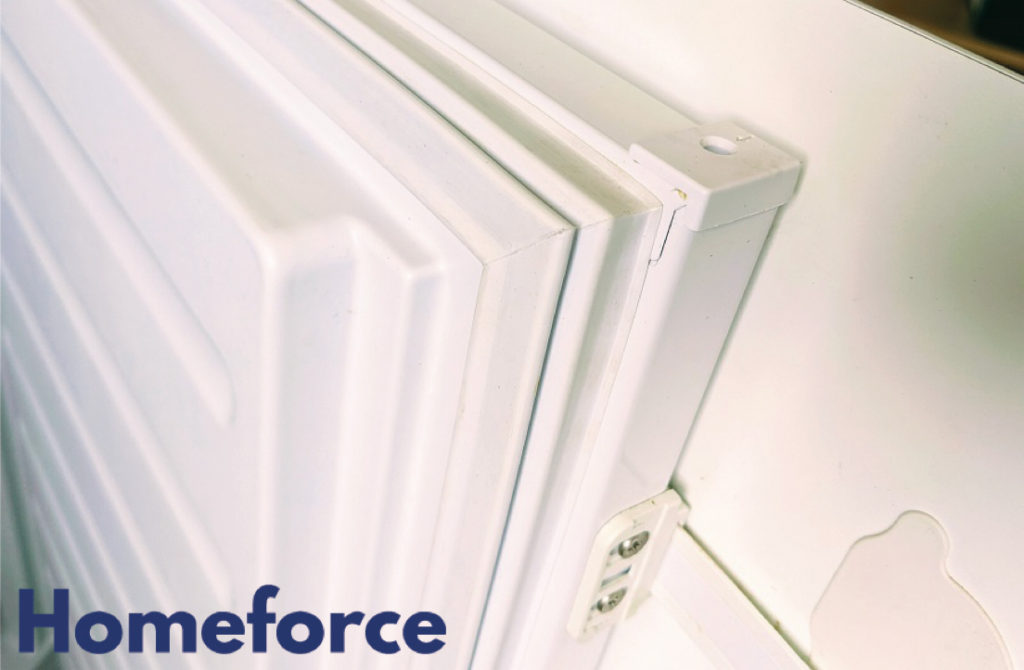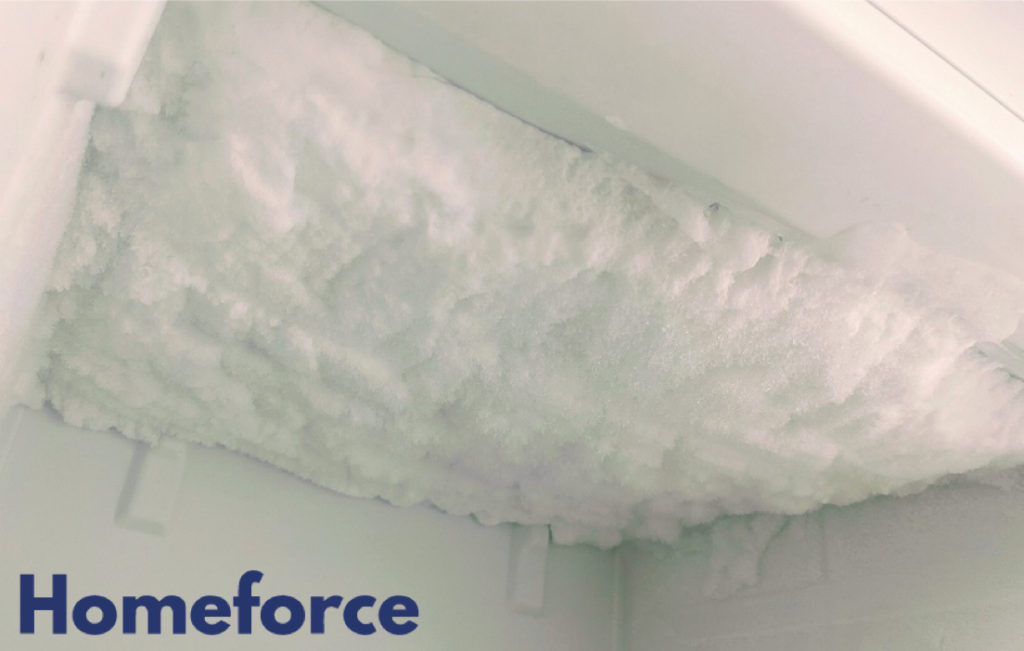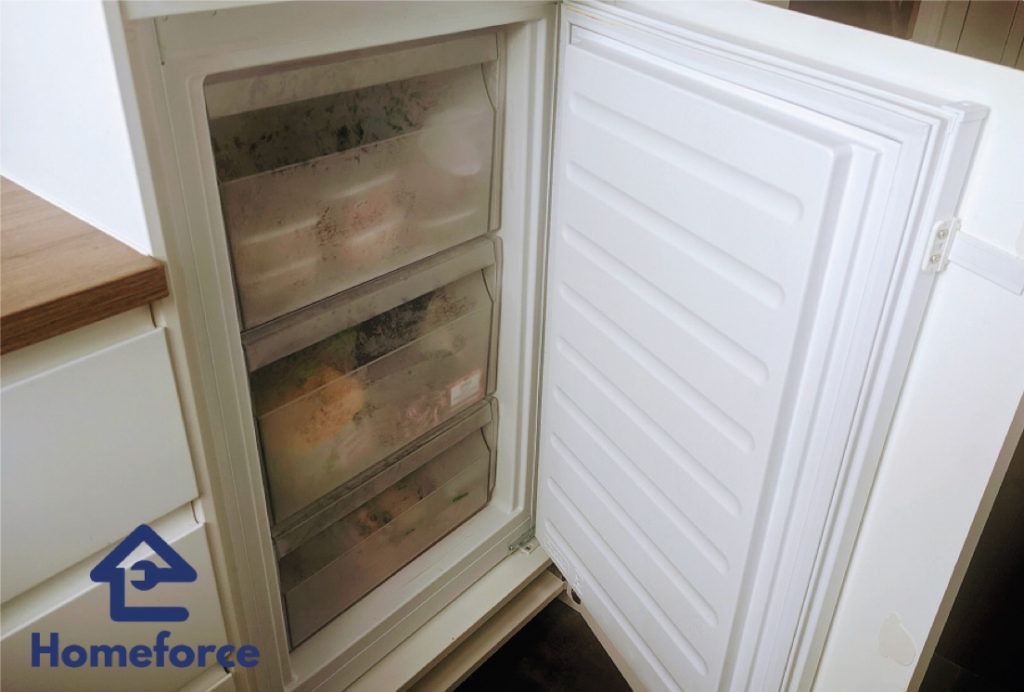Written On
Tue 7th June 2022
Written By
Homeforce
Category
Guides
Share This
Life throws us some random and minor frustrations at times. The kind of things that seem like nothing, but start to affect our daily life. This then draws our attention and it becomes yet another problem to deal with. Your freezer icing up can easily be one of those things.
So that’s what we’re tackling in this article. We’ll explore the top reasons why your freezer might ice up first, and then offer the top 8 tips on how to fix it. Plus what to do if it’s already iced up!
If your freezer is making a noise, then it could be for similar or unrelated reasons. So check our article here concerning freezer noises.
So, why does my freezer ice up? Here’s why…
Why your freezer is icing up
1. The freezer is too full
If your freezer is packed to the brim, there’s not enough circulation of cold air. This can cause moisture to build up and turn into frost or ice.
The solution is simple: leave some space in your freezer.
2. The freezer door is left open too often
We’re all guilty of this at one point or another. We open the freezer door to grab something, and then we forget to close it properly – and sometimes we leave it open just by mistake while we’re reaching for something else.
That little bit of warm air that comes in each time will slowly increase the temperature inside the freezer, causing ice to form.
3. The gasket seal is damaged
The gasket is the rubber seal around the door that helps keep the cold air in and the warm air out. If this seal is damaged or not sealing properly, cold air can escape and warm air can get in, leading to frost and ice.
The frost and ice will make it harder for the freezer to stay cold enough and will cause the compressor to work overtime – which is not only a waste of energy but can also shorten the lifespan of your freezer.
4. The door isn’t sealing properly
A follow up to the previous point. A freezer door that doesn’t seal properly is one of the most common reasons for ice buildup.
If there’s a space around the door, then cold air can escape every time it’s opened.
Sometimes this can be caused by dust and debris around the gasket (rubber seal) around the door. This can happen particularly along the base of the fridge door – often without you realizing it.
This means that the freezer has to work harder to keep cool, which can lead to ice buildup.
The solution is to clean the gasket and the area around it using a soapy cloth. If there are any cracks or holes in the gasket, then it will need to be replaced.

5. The freezer isn’t level
This is one of those simple things that you don’t realize might have an impact.
If your freezer isn’t level, then this means the door (or lid) probably isn’t level, and again the rubber gasket won’t seal properly.
This means that cold air can escape and warm air can get in, leading to frost and ice.
Sometimes once the freezer settles into place, any slight warping of the unit can send the door out of alignment. This can then be further compounded by some of the other door issues outlined above.
6. The freezer temperature is set too high
The ideal freezer temperature is between -18°C and -22°C. If it’s set any higher than this, then it won’t work as efficiently.
This means that there’ll be more moisture in the air, which will turn to ice. More ice means more frost, and the whole process starts again!
7. The freezer is too old
As with any appliance, your freezer will have a limited lifespan. With time, the sealant will degrade and the door won’t close as tightly.
As your freezer gets older, the components will also start to wear out. This can lead to a build-up of ice and frost.
If your freezer is more than 10 years old, it might be time for an upgrade!
You can keep your fridge running smoothly by ensuring any breakages are dealt with quickly. So much so, that the cost of fixing a freezer can often be clawed back in longer unit performance.
For that, all you need to do is check out our appliance cover plan. It’s easy to sign up and we will take care of your appliances for you.
Another thing to check is if your fridge is freezing up at the back of the unit. So check our fridge freezing up article if you discover it is.

How to prevent a freezer from icing up
There are a number of things you can do to prevent your freezer from icing up:
- Use a Freezer Frost Remover Spray. This will help to remove any ice build-up quickly and easily. But use regularly, and before it becomes a problem that spray can’t solve.
- Clean the freezer regularly. This will prevent a build-up of ice and frost. Check the unseen places such as under doors and at the back of top-loading freezer lids.
- Ensure the door seals are tight. This will stop cold air from escaping and warm air from entering. Check rubber is also not damaged or looks aged and brittle.
- Check the thermostat. This will ensure the freezer is set to the correct temperature – and keep an eye on it to make sure it’s working correctly.
- Open your freezer less often. It might sound impossible, but there’s no need to check on your food every five minutes. Every time you open the door, cold air escapes and warm air enters, causing the freezer to work harder. And try to be quick when you get something.
- Arrange Your Food in an orderly fashion. When you’re looking for something, you might move everything around, causing cold air to escape. So put like items together and make sure they’re easy to grab when you need them.
- Clean the Condenser Coils. These are the black coils usually located on the back of your freezer. These can attract dust and dirt, which can make your freezer work harder than it needs to. So clean them off every few months with a vacuum attachment or a coil brush.
- Defrost Your Freezer Regularly. Ice buildup can cause your freezer to work overtime, so it’s important to defrost it every so often. Most freezers have a built-in de0icing mechanism, so make sure to consult your freezer’s manual to see how often you should be defrosting it.
- Don’t overload the freezer. This can make it harder for air to circulate, which can lead to ice build-up. So try not to pack the freezer too full and leave some space between items.
- 10.Check the freezer temperature. Your freezer should be set between -18°C and 22°C. If it’s set any lower than that, it can cause ice buildup
These are ways to prevent it, and help keep your freezer from breaking too often – or shortening its lifespan.
But how do you now deal with your current iced up freezer? Here are a few ways to get it running back to normal.

What to do if your freezer is already iced up
So if your freezer is already iced up, don’t panic! There are a few easy ways to fix the problem:
- Use the defrost function. Many freezers have built-in defrost functions. It can take a long time, but it works well. You may need to remove and store food while this process takes place. Or you can try to speed it up with the options below.
- Use a hairdryer. This will help melt the ice quickly. Just be careful not to use it for too long, as you don’t want to overheat the freezer.
- Use a brush. This can help break up the ice so that the hairdryer can do its job more effectively. Try not to use hard utensils that might cause damage to the internals of the freezer.
- Turn up the temperature. This one’s relatively easy and is similar to the defrost function. This will help in speeding up the melting process. Just be sure to turn it back down once the ice is gone.
- Remove items. If the ice is only on one side of the freezer, try removing some of the items from that side. This can help improve airflow and prevent further icing.
- Use salt. Salt can help lower the freezing point of water, which can in turn help melt the ice more quickly. This can also work well for the floor of the freezer. Just be sure not to scratch the interior, or use too much.
- Warm water. This is another method that can help target the ice specifically. Place a container with boiled water inside the compartment and it will help raise the temperature. The steam will also help to melt the ice.
- Replace the freezer. If all else fails, then it might be time to replace your freezer with a new one. An old or faulty freezer is more likely to ice up frequently, so this can be the best solution in some cases.
If your freezer is icing up, then it’s important to identify the cause so that you can fix it. Otherwise, you’ll be constantly defrosting and cleaning it!
In turn, the freezer will quickly deteriorate, and you’ll need a replacement way too soon. Keep your freezer – and all your appliances – in tip-top condition by getting things repaired quickly and without the added stress. Get appliance cover now and we’ll do the rest.